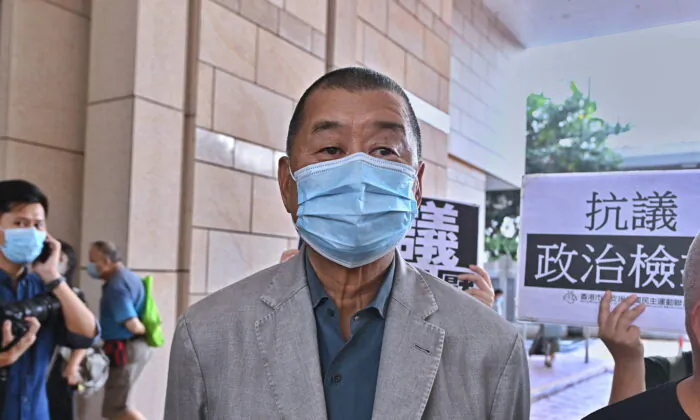
Hong Kong’s High Court issued a ruling on May 19, dismissing the application for judicial review by the legal team of Jimmy Lai, founder and owner of the Apple Daily Newspaper and the Next Digital media group, in an effort to overturn the “recommendation” made to Immigration by the territory’s Committee for Safeguarding National Security, to deny British lawyer Tim Owen any working visa to come to Lai’s re-scheduled trial in September.
Apple Daily’s headquarter was raided and Lai arrested by Hong Kong police in August 2020. Multiple charges were brought against Lai, including “collusion with foreign forces” under the city’s new National Security Law (NSL) imposed by Beijing six weeks earlier, in June.
Tim Owen KC, a Briton, has been part of the legal team defending Jimmy Lai, and the NSL-related trial was originally scheduled for December 1, 2022.
The government (Department of Justice) had been wanting Owen out of Lai’s case, with the rationale that engaging foreign lawyers in an NSL related case would post “security risks.” However various Hong Kong courts ruled four times in favor of Lai, allowing his hiring of overseas counsel, the very last ruling from the Court of Final Appeal was made only days before the December trial began.
CFA’s ruling prompted Hong Kong Chief Executive John Lee to step in overnight, calling for Beijing to intervene and overrule the decision made by Hong Kong’s judiciary. Lai’s trial was first postponed to Dec 13, and then again to September the next year, as Beijing’s “quick response” expected by John Lee did not arrive till the end of that year.
CCP’s top legislative body didn’t directly rule whether foreign lawyers who do not normally practice in the city could handle national security cases, but passed the power to decide to Hong Kong Chief Executive and the city’s Committee for Safeguarding National Security.
The committee had recommended to the Director of Immigration in January to deny Owen’s visa application in relation to Lai’s case, in view of “national security risks,” which the immigration had reportedly accepted. Lai’s legal team responded with an application for judicial review, to have the committee’s recommendation and the decision by the director of immigration overturned.
Owen travels in and out out Hong Kong on working visa for different cases and was last seen in court in January. Earlier report from local media said his working visa for a hearing in May had also been granted.
Senior counsel Robert Pang on Jimmy Lai’s team argued in the application that when Beijing interpreted Hong Kong’s national security laws, it stated that if Hong Kong courts did not obtain a certificate from Hong Kong Chief Executive regarding the participation of overseas lawyers in national security cases, the Committee for Safeguarding National Security should intervene and make judgments based on Article 14 of the NSL. However, the Article does not grant the committee any other powers, including suggesting to the immigration department to refuse visa applications from overseas lawyers. The Committee for Safeguarding National Security exceeded its authority by recommending to Immigration that it should deny the visa application of Owen. Such recommendation should therefore be viewed as unconstitutional or invalid.
In the written ruling to reject Lai’s application for review, High Court’s chief judge Jeremy Poon stated that according to the provisions of the NSL, “No institution, including the executive authorities, legislature, and judiciary, organization or individual in HK shall interfere with the work of the Committee for Safeguarding National Security,” “the legislative is not subject to review based on any alleged incompatibility as between the NSL and the Basic Law,” and the “courts have no power to hold any provision of the NSL to be unconstitutional or invalid.”
The judge concluded that the relevant recommendation did not exceed the authority conferred by the NSL, and the Director of Immigration did not exceed the authority conferred by the NSL.
Regarding the provisions in the NSL that “decisions made by the Committee for Safeguarding National Security are not subject to judicial review,” Robert Pang originally argued that it only applies to decisions within the jurisdiction of the Committee for Safeguarding National Security. The court can and should intervene if the Committee for Safeguarding National Security’s decision exceeds its jurisdiction. He questioned whether all decisions made by the Committee for Safeguarding National Security could not be challenged, as that would grant it even greater power than the Chief Executive. For example, would the court be powerless to intervene if the Committee for Safeguarding National Security imprisons someone until death or confiscates their assets? “I’m afraid we are saying goodbye to a huge chunk of the rule of law,” he said.
Last Tuesday, more than 100 prominent publishers and editors around the world—including 2021 Nobel Peace Prize laureates Dmitry Muratov and Maria Ressa—signed a joint statement initiated by Reporters without Borders, calling for Lai’s immediate release.